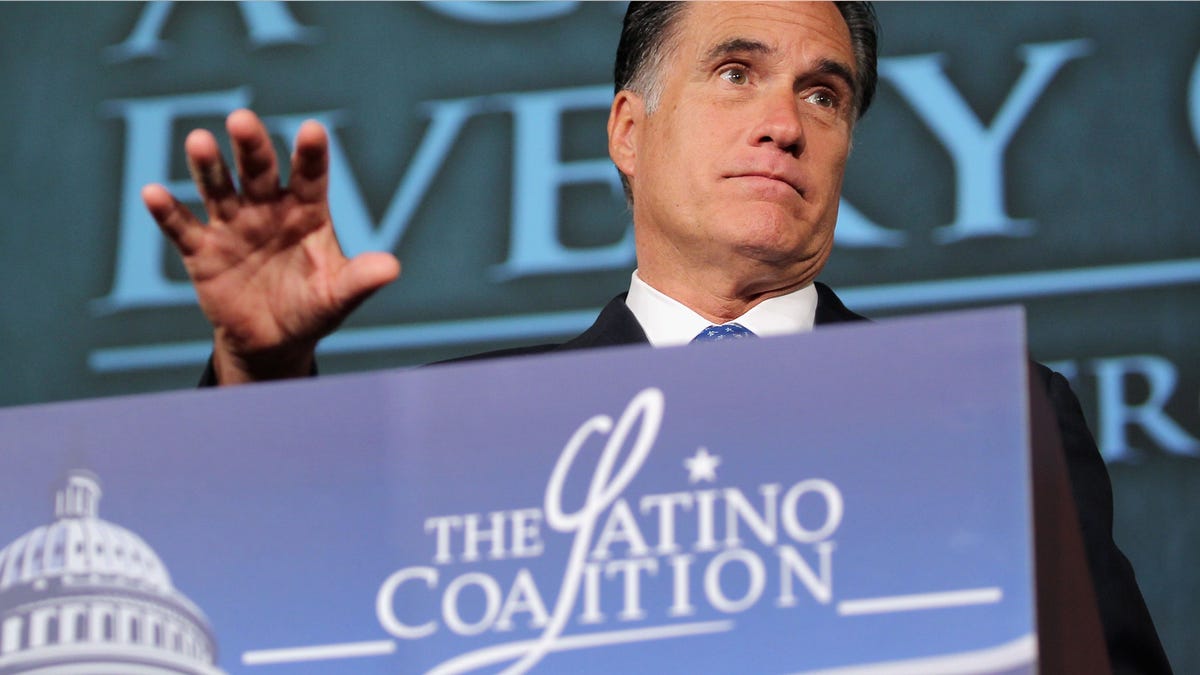
Republican presidential candidate, former Massachusetts Gov. Mitt Romney addresses the Latino Coalition;s 2012 Small Business Summit at the U.S. Chamber of Commerce . (2012 Getty Images)
When Gov. Susana Martinez, Gov. Brian Sandoval, Sen. Marco Rubio and Senate candidate Ted Cruz took to the stage during the Republican Convention, the GOP may have finally accomplished the first step in winning back Latino voters.
The nationally broadcast parade of powerful Hispanic leaders was undeniably impressive.
These Latinos weren't carted out for show, as some cynics have charged, nor were they sent back to their rooms afterward.
Having Marco Rubio introduce Mitt Romney, and having prominent Hispanics emerge front and center during the convention, sent a clear message to Hispanics across the country -- these up and coming Republican stars represent a new era of Latino empowerment and involvement.
Message received.
In fact, the message was so clear -- and so well received -- that after the convention, polls show Romney was able to close the gap on President Obama for the Latino vote and by no small margin.
According to the latest Fox News Latino poll, he is trailing President Obama by 60 percent to 30 percent among Latinos. For Romney, it is an improvement, to be sure, over polls released earlier this year showing Obama leading with up to 70 percent of support among Latinos, while the governor hovered at about 20 percent.
In fact, while Romney may have failed to register the all important post-convention bump among the general population, he did in fact gain among Hispanics by hitting the 30 percent mark for the first time in his candidacy.
That places Romney just one point behind John McCain's 31 percent and within striking distance of Ronald Reagan's 37 percent. Not bad for a candidate who, as the media often suggests, could lose the election because Latinos will turn out in throngs to vote against him.
So is the Republican Party showing it is willing to involve Latinos? Check.
Job well done? Yes.
Time for a victory lap? Hardly.
Why? Because involvement is only the first part of the strategy to win over the country's fastest growing bloc of voters.
The next step is engagement, understanding and investment. The GOP needs to plant seeds that will bear fruit in this fertile soil because, as President Obama has discovered, saying and promising isn't the same as doing.
While Romney may have failed to register the all important post-convention bump among the general population, he did in fact gain among Hispanics by hitting the 30 percent mark for the first time in his candidacy.
A recent Pew study shows that when compared to the general U.S. population, Latinos are as conservative, or in the case of recent arrivals, even more conservative than average Americans. Their ideology when it comes to jobs, religion, family and traditional values matches or surpasses those of conservative Americans.
So what happens? Why the disconnect in the voting booth?
One word: immigration. And this is where investment comes into play.
No, not capital investment, which Latinos ideologically feel is an area where they can fend for themselves through hard work, but rather human investment.
Last fall, I was with then-candidate Newt Gingrich at a campaign stop at the Versailles restaurant in Miami, Florida when a woman who was not Latina stood up from the crowd and demanded to know what he would do about "getting rid of the illegals."
He quietly and calmly said to her, "Ma'am, if you mean what will I do with a grandmother who's raised her children and her grandchildren in America, goes to church, has never been arrested and has worked here her entire life," and then pausing, looking right at his questioner as she slumped back in her chair, continued, "that woman has contributed to our country, and I will not deport her because she's good for America."
It wasn't what the woman wanted to hear, but it was exactly what Latinos need to hear from Mitt Romney and the GOP in a state that could decide the election and where a whopping 10% of Latinos are undecided.
Florida's undecided Latino voters, mostly Cuban American or Puerto Rican and thereby U.S. citizens, may not be directly affected by immigration policy, but as Latinos they certainly understand tone.
By telling the story of that mother and grandmother in the most human of terms, Gingrich demonstrated that he is invested in understanding the plight of all Latinos in America.
It's the story that more than thousand Latinos wished they'd heard from Mitt Romney recently when he spoke in Los Angeles to deliver his pitch to the annual meeting of the US Hispanic Chamber of Commerce.
"I'm convinced the Republican Party is the rightful home for Hispanic Americans," Romney told the group.
He then told the audience he opposed any amnesty for the estimated 12 million undocumented immigrants currently living in the country. The room fell silent.
Victor Arias was at the Romney speech.
The Dallas businessman, who considers himself both conservative and undecided, came away disappointed.
When interviewed after the speech, Arias told NPR "I do think he [Romney] is still a little disconnected from the majority of Hispanics in the country."
I emailed Arias as I write to make sure NPR had quoted him accurately and to see if he stood by his statement.
His immediate reply: "Yes, use it."
Romney's comments stand in stark contrast to Gingrich's.
One could be defined as a closed door, the other an open heart.
One shows, regardless of policy, a lack of understanding of who Latinos really are by assuming they want something for nothing. The other shows that Latinos, legal or not, may be no different from generations of Americans who came before them.
To capture the Latino vote, there needs to be both involvement of Latinos and investment in Latinos.
Romney and company have nailed the first part. Now it's time for them to get working on the second part.












































